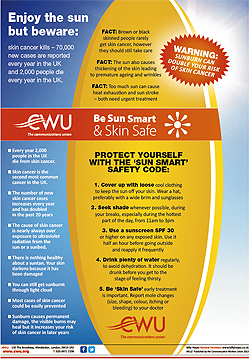Without Using Sunsceen Outdoor Workers Risk Skin Cancer Warns CWU
As the weather improves, and the temperatures throughout much of the UK have recently been above 20 degrees Celsius, the Health, Safety & Environment Department is taking the opportunity to warn members about the risks associated with hot weather, dehydration, sun stroke and Skin Cancer through sunlight/UV ray exposure.
 Despite the HSE guidelines outlining that UV radiation should be considered an occupational hazard for those who work outdoors, and that employers should provide adequate training and supervision, it has been revealed in a study by the Institution of Safety and Health (IOSH) that 70% of workers in large UK construction companies have not had any training on the risks of working in the sun.
Despite the HSE guidelines outlining that UV radiation should be considered an occupational hazard for those who work outdoors, and that employers should provide adequate training and supervision, it has been revealed in a study by the Institution of Safety and Health (IOSH) that 70% of workers in large UK construction companies have not had any training on the risks of working in the sun.
Five outdoor workers are diagnosed with skin cancer every day in the UK: yet 90% of skin cancer deaths could be prevented if our exposure to UV rays were controlled., say IOSH
Their No Time To Lose Solar Radiation Campaign says that, two thirds of outdoor workers, including roofers, landscapers, electricians, builders and gardeners do not know that they are at risk of getting skin cancer whilst at work, and although 90% of construction workers use sun screen on holiday, only 59% use it at work.
Writing in his letter to all CWU branches (LTB293/16), CWU’s
National Health, Safety & Environment Officer Dave Joyce explains about the risks for outdoor workers:
Dangers of UV rays
The short-term risks of sun exposure are sunburn and sunstroke.
The longer-term risks (over decades) include:
• actinic (solar) keratoses – rough and scaly pre-cancerous spots on the skin
• skin cancer – including both melanoma and non-melanoma skin cancer
• eye problems – such as photokeratitis (snow blindness) and cataracts
• premature ageing of the skin and wrinkling
Here is some important advice regarding firstly following the 5 S’s and secondly the message "early detection saves lives so act quickly and seek advice".
 The FIVE S’s of Sun Safety
The FIVE S’s of Sun Safety
The main cause of skin cancer is exposure to sunlight or sunbeds. Remember, it is not just sunbathing that puts people at risk, but just being in the sun without adequate protection.
If you’re an outdoor worker and/or take part in outdoor hobbies, activities or sport you will be at greater risk.
Sunburn increases the risk of Skin Cancer and a Sun Tan isn’t healthy! It indicates that the skin has been damaged! And that damage stays there increasing the person’s risk of skin cancer.
To keep safe and make sure you NEVER BURN you should follow the 5 S’s of Sun Safety:-
1. SHOULDERS – COVER UP – The Royal Mail Clothing Fabrics are ‘UV protective’ so always try and keep your shoulders and body covered up.
2. SUN HAT – Always wear a broad-brimmed hat that shades your face, neck and ears – Royal Mail provide these as part of the Uniform so order one and use it.
3. SUNSCREEN – Apply a good quality SPF 30+/ min 3 star rating sunscreen with broad spectrum UVA protection, to exposed areas of skin – making sure you use enough and reapply every 2 hours.
4. SUNGLASSES Wear wrap-around sunglasses with UV protection to give your eyes adequate protection from the sun’s rays.
5. SHADE Always seek shade whenever you can, particularly during the hottest time of the day between 11am-3pm and when you have breaks if your job keeps you out in it.
Avoid Dehydration
Be wary of dehydration – the lack of sufficient water in the body. The best way to beat dehydration is to drink before you get thirsty. If you wait until after you’re thirsty, you’re already dehydrated. Water is important to the body at all times, but especially in warm weather. It keeps the body from overheating.
When you exercise or work, your muscles generate heat. To keep from burning up, your body needs to get rid of that heat. The main way the body discards heat in warm weather is through sweat. As sweat evaporates, it cools the tissues beneath. Lots of sweating reduces the body’s water level, and this loss of fluid affects normal bodily functions so you need to replace the fluid. Take Water with you when working outside and drink plenty.
Early Detection
Detecting skin cancers early save lives – FACT!
Particularly in the case of Melanoma, the deadliest form of the disease. It is important to check your skin regularly for signs of change, and consult your doctor immediately if you detect any changes particularly with moles, or if you’re unsure of any unusual marks, patches, sores or spots, no matter how small they are – get the GP to check it out.
Look after your skin, stay safe in the sun! – Don’t become a statistic and enjoy the sun SAFELY.
Source: CWU / IOSH
Posted: 1st January 2016
